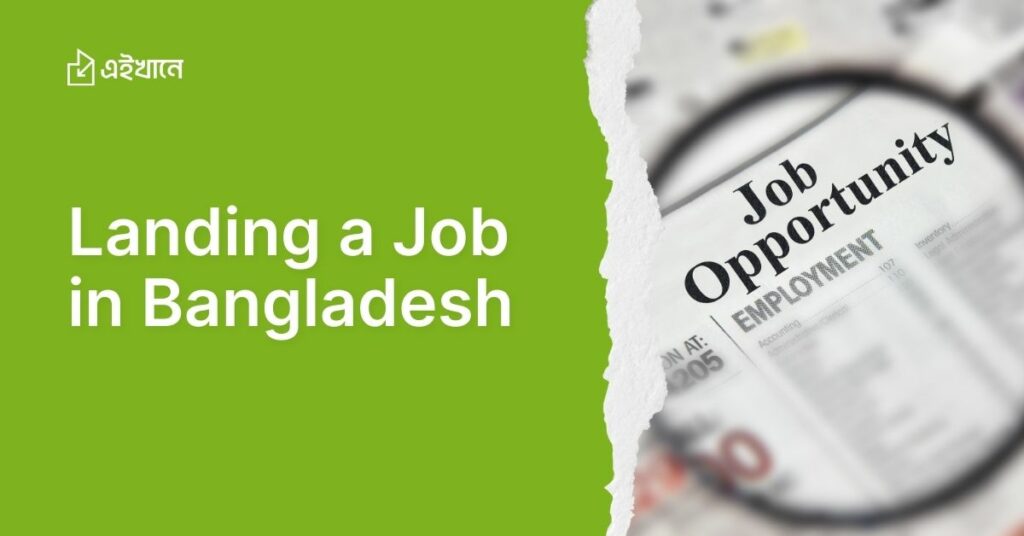5 Must-Know Tips for Creating a Winning CV in Bangladesh’s Job Market
1. Tailor Your CV for Each Job Application
One of the most crucial things to remember while crafting your CV is that a “one-size-fits-all” approach doesn’t work in Bangladesh’s competitive job market. Customize your CV to highlight the skills and experiences that are most aligned with the specific job you are applying for. For instance, if you’re applying for a marketing role, emphasize your communication prowess, digital strategy experience, and creative projects. This increases your chances of standing out to hiring managers.
2. Keep it Concise and Relevant
Bangladeshi recruiters typically spend limited time scanning each CV. As a result, your CV should be concise and only include relevant information. Avoid including unnecessary details like long lists of non-related courses or outdated experiences. Instead, focus on key achievements and responsibilities that align with the job you’re seeking. Stick to 2 pages of content at most, with a keen focus on highlighting your core strengths.
3. Highlight Key Skills With Bullet Points
When listing your skills and accomplishments, use bullet points rather than long paragraphs as they make your CV easy to skim through. Focus on quantifiable achievements, such as “Increased sales by 20% within six months,” instead of vague statements like “Contributed to team success.” This approach not only makes your CV visually appealing but also quickly shows potential employers what value you can bring to their organization.
4. Use Professional Formatting and Design
While creativity in design might work for industries like advertising or graphic design, most Bangladeshi employers expect a clean, formal layout for your CV. Use a simple font like Arial or Calibri, utilize bold headings to indicate different sections, and ensure spacing between lines isn’t cramped. A well-structured CV will leave a positive impression and boost readability, helping you stand out in a crowded field of applicants.
5. Include Localized Information
Employers in Bangladesh often look for specific local details that might not be necessary in other countries. For example, include your National ID number (if requested), relevant contact information, and even a professional photo if the industry expects it. Make sure to also mention any Bengali language proficiency, especially for roles that require strong communication skills with local teams. Providing this localized information can make your application more attractive to Bangladeshi recruiters.
How to Navigate Job Portals and Network Effectively in Bangladesh
1. Use Popular Job Portals for Maximum Reach
There are several job portals in Bangladesh that serve as the primary platforms for job seekers and employers alike. Websites like BDJobs.com, Chakri.com, and Prothom Alo Jobs provide thousands of listings in multiple categories. Create an account on these platforms, fill out your profile completely, and upload a well-organized CV to maximize your visibility. Don’t forget to set up email alerts for job postings that match your qualifications and interests.
2. Regularly Update Your Profile and Resume
Once you’ve created a profile on Bangladeshi job portals, regularly update it to ensure it remains relevant to the current job market. Include new skills, certifications, and experiences as they come. Employers often search the database for fresh candidates, and an updated profile shows you’re actively seeking opportunities. Additionally, revise your CV to reflect the most recent achievements and tailor it to incorporate industry buzzwords.
3. Follow Company Pages and Industry Leaders
Most job portals have company profiles where businesses post job openings and provide updates. Following these pages allows you to stay informed about the latest opportunities. Furthermore, social media platforms like LinkedIn play an important role in Bangladesh’s job market. Following industry leaders and recruiters not only keeps you updated but also increases your chances of being noticed by individuals in positions to hire.
4. Leverage Professional Networking Platforms
While job portals are essential, online professional networks like LinkedIn are equally critical in Bangladesh’s growing employment landscape. Create a strong LinkedIn profile with a clean profile picture and a compelling summary. Connect with professionals within your field, participate in relevant group discussions, and share your thoughts on industry trends. Many jobs are filled before being advertised publicly due to networking, so being active on such platforms can open doors that job portals won’t.
5. Attend Webinars, Workshops, and Career Fairs
Virtual and in-person events like career fairs, industry-specific webinars, and workshops offer excellent opportunities to network directly with recruiters and professionals in your sector. Participating in these events not only helps build connections but also provides you with access to job openings that might not be available on job portals. In Bangladesh, many companies use these events for talent hunting, especially for fresh graduates.
6. Utilize Offline Networking Opportunities
While online platforms hold significant weight, offline networking remains powerful in Bangladesh, particularly through alumni networks, industry clubs, and personal references. Attend local business and social events to connect with potential employers or consultants who could introduce you to job opportunities within their organizations. Personal recommendations or referrals carry considerable value in Bangladeshi hiring practices, especially when competition is stiff.
7. Join Professional Associations
Bangladesh has various professional associations and industry groups like BASIS (Bangladesh Association of Software and Information Services) for IT professionals, and other prominent bodies for engineering, business, and healthcare sectors. Becoming a member of such organizations can give you exclusive access to niche job boards, seminars, and networking events. This kind of association membership often reflects positively on your resume as well, demonstrating engagement with the broader professional community.
Understanding Bangladesh’s Corporate Culture: Essential Tips for Job Seekers
1. Respect for Hierarchy and Authority
In Bangladeshi corporate culture, respect for hierarchy is deeply ingrained. Most companies have a well-defined structure where authority rests with senior management, and decisions often flow from the top down. As a job seeker, it’s important to understand this dynamic and approach your superiors with the appropriate level of formality and deference. Addressing managers politely and following traditional norms of respect can leave a strong positive impression during the hiring process.
2. Importance of Teamwork and Strong Relationships
Bangladesh places high value on collective teamwork and interpersonal relationships within the workplace. Building rapport with colleagues and maintaining smooth collaboration is critical to long-term success. During the interview process, emphasize your ability to work effectively in teams and your interpersonal skills. Demonstrating that you can contribute positively to workplace harmony will be seen as a key asset by many employers. Furthermore, once hired, continue cultivating good relationships through regular interactions and being approachable.
3. Punctuality and Commitment are Key
While flexibility in work hours may vary across industries, punctuality and commitment are widely regarded as essential traits in Bangladesh’s corporate environment. Being on time for interviews, meetings, and even informal company events signals respect and professionalism. Potential employers will likely expect candidates to conform to these standards. Thus, it’s advisable to demonstrate reliability not only during the recruitment phase but also when establishing yourself as an integral part of the team.
4. Conservative Dress Code and Presentation
Dress codes in Bangladesh tend to be conservative, particularly in industries like finance, law, and government. For most professional roles, formal attire is expected—suits for men and modest business attire for women. Taking care to present yourself smartly and appropriately during the interview process shows respect for the organization’s culture. Additionally, many Bangladeshi companies appreciate attention to grooming and neatness as indicators of professionalism and responsibility.
5. Strong Emphasis on Communication Skills
Effective communication is highly valued in Bangladesh, where both verbal and non-verbal cues play important roles in daily interactions. Being able to express yourself clearly in Bengali and English is a tremendous advantage, especially in companies that interact with international clients. During interviews, make sure to articulate your thoughts clearly and positively. Listening skills are also important; show that you’re receptive to feedback and can negotiate or discuss matters diplomatically.
6. Adaptability and Resourcefulness Are Valued
Many Bangladeshi organizations, especially startups and smaller enterprises, appreciate employees who are adaptable and resourceful. Markets can shift rapidly, and businesses expect employees to handle multiple responsibilities or adjust according to new priorities smoothly. Highlighting your flexibility, problem-solving skills, and ability to take on various tasks during the interview stage will make you a more compelling candidate, particularly for fast-growing industries like IT or manufacturing.
7. Work-Life Balance and Overtime Expectations
The concept of work-life balance is gaining traction in some sectors of Bangladesh, but there are still industries where overtime is expected, especially during peak seasons or key projects. Some companies may expect their employees to stay late or work on weekends to meet deadlines. Be prepared for these expectations and ask about work hours during the interview process. Show your potential employer that you are committed to delivering results, while also seeking clarity on how the organization approaches work-life balance.
8. Familiarize Yourself with Local Business Etiquette
Understanding local customs and business etiquette is crucial when navigating Bangladesh’s corporate culture. For example, offering a handshake upon meeting is common, though conservative settings might require more restraint in physical greetings, especially between men and women. Another point to remember is that networking is often done over meals or tea in more informal settings. Recognizing these nuances and adjusting your behavior accordingly can enhance your chances of building strong connections and successfully landing a job.
Top Industries Hiring in Bangladesh: Where to Focus Your Job Search
IT and Software Development
Bangladesh’s IT sector is growing rapidly, with the government providing significant support to make the country a regional hub for technology. Companies in software development, IT services, mobile app development, and data analytics are always on the lookout for skilled professionals. If you have a background in programming, software engineering, or cybersecurity, this industry offers numerous opportunities, especially with Bangladesh Association of Software and Information Services (BASIS) actively promoting IT talent.
Garments and Textiles
As one of the world’s largest producers and exporters of garments, Bangladesh’s textile industry remains a top employer. Careers in textile engineering, production management, quality assurance, and retail merchandising are highly in demand. This sector also offers roles in supply chain logistics and export-import management due to the industry’s significant global interactions. Even amidst automation trends, skilled workers and engineers are valuable for optimizing efficiency and innovation in manufacturing processes.
Banking and Financial Services
The banking and financial services industry in Bangladesh is another key area for job seekers. With the expansion of digital banking, financial technology (FinTech), and mobile payment solutions, there’s growing demand for professionals in accounting, finance, risk management, and investment analysis. Both public and private sector banks, as well as newly emerging FinTech companies, provide ample career options for individuals seeking stable, long-term employment in this sector.
Telecommunications
With significant advancements in mobile communications and internet infrastructure, the telecommunications industry is booming. Companies like Grameenphone, Robi, and Banglalink are not only expanding their communication services but are also at the forefront of digital transformation. Jobs in network engineering, customer service, product development, and even marketing are highly sought after within this industry. Moreover, with the arrival of 5G technology, opportunities in technical implementation and management will continue to grow.
Healthcare and Pharmaceuticals
The healthcare and pharmaceutical sectors in Bangladesh are expanding quickly, especially in areas like medical device manufacturing, hospital management, and drug research and development. There’s a high demand for doctors, nurses, pharmacists, laboratory technicians, and specialists, driven by the need to improve healthcare infrastructure. The pharmaceutical industry also provides lucrative opportunities in R&D, quality control, and regulatory affairs given that Bangladesh is a key player in generic drug production.
Construction and Real Estate
The construction and real estate sectors in Bangladesh are thriving due to increased urbanization and government-led infrastructure projects. Engineers, architects, project managers, and construction workers are in high demand, especially in cities like Dhaka and Chittagong. Whether it’s residential, commercial, or industrial development, professionals who can manage large projects efficiently are highly valued. Expanding real estate also fuels demand in property management, sales, and marketing roles.
Education and E-Learning
With the rise of online education platforms and the increasing focus on quality education, the education sector is evolving. Opportunities in teaching, educational administration, curriculum development, and technology-based learning solutions are on the rise. E-learning startups are gaining traction as well, creating roles in content creation, instructional design, and digital education platform management. English language proficiency and certifications in specialized subjects can give job seekers an edge in this sector.
FMCG (Fast-Moving Consumer Goods)
Bangladesh’s FMCG sector—comprising daily consumer goods like food, beverages, and household products—is another major employer. Large multinational firms such as Unilever, Nestlé, and local giants like PRAN-RFL Group are constantly on the lookout for professionals in product development, brand management, sales, and distribution. The sector also calls for supply chain experts and marketing professionals well-versed in consumer behavior and digital advertising, thanks to the rising popularity of e-commerce platforms.
Renewable Energy and Green Technology
As Bangladesh pushes toward sustainability and energy efficiency, the renewable energy sector is gaining prominence. This burgeoning industry offers opportunities in solar energy, wind power, and bioenergy. Professionals with expertise in environmental science, electrical engineering, and sustainable development can find rewarding careers in this field. Additionally, many international organizations and NGOs are working within this space, leading to further employment options in project management and environmental consulting.
Logistics and Supply Chain Management
Bangladesh’s strategic location has led to an increase in logistical and supply chain activities, particularly linked to exports from the manufacturing and garment industries. As the country integrates more with global trade networks, demand is rising for supply chain managers, warehouse supervisors, and logistics coordinators. E-commerce’s growth has also led to a boom in delivery and courier services, making this industry critical for both domestic and international trade.
Interview Success: Key Strategies for Standing Out in Bangladesh’s Job Market
1. Research the Company Thoroughly
Before stepping into an interview, you must have a firm understanding of the company’s mission, values, and the role they play in the Bangladeshi market. Familiarizing yourself with key products, services, and company culture allows you to craft responses that show alignment with their goals and values. In Bangladesh, where culture fit can be as important as technical skills, this research will impress recruiters and demonstrate your genuine interest in the position.
2. Prepare for Common Interview Questions
While every interview is unique, certain questions are frequently asked during job interviews in Bangladesh. These may include “Why do you want to work here?” or “What are your strengths and weaknesses?” Familiarizing yourself with these common questions and preparing thoughtful, concise answers can help reduce nervousness and present yourself confidently. Be sure to incorporate specific examples from your professional history to make your answers more compelling.
3. Emphasize Your Problem-Solving Skills
Many companies in Bangladesh value candidates who are adaptable and resourceful, especially in industries like IT, manufacturing, and financial services. During your interview, highlight real-life examples where you successfully solved problems or adapted to changes. Whether it was improving a process at your previous job or handling a challenging project, showcasing these abilities can set you apart from other candidates by showing how you’ll add value to the organization.
4. Practice Clear and Effective Communication
In Bangladesh’s corporate environment, communication skills—particularly fluency in both Bengali and English—are highly valued. Make sure to articulate your thoughts clearly during the interview, balancing confidence with politeness. Avoid overly technical language unless the role specifically requires it, and focus on conveying your ideas in a concise and professional manner. Practicing your responses ahead of time can improve your delivery and reduce stammering or awkward pauses.
5. Demonstrate Cultural Awareness and Adaptability
Understanding and acknowledging the importance of hierarchy, teamwork, and respect for authority in Bangladeshi corporate culture is essential. During the interview, exhibit cultural awareness by addressing senior interviewers respectfully, using formal greetings, and recognizing the company’s internal structure. Additionally, emphasize your ability to work well within teams and your willingness to adapt in dynamic environments, especially if you’re applying for a Bangladeshi multinational or any large-scale organization.
6. Dress Appropriately for the Role and Industry
As mentioned earlier, the dress code in Bangladesh is typically conservative, especially in sectors like finance, law, and government. Arrive at your interview wearing smart, professional attire that aligns with the industry norm. For men, this usually means a suit; for women, modest business attire is expected. Ensuring that you are neat and well-groomed will reflect professionalism and respect for both the interview and the company’s work culture.
7. Ask Insightful Questions About the Role
At the end of most interviews, you’ll be given the opportunity to ask questions. This is a chance to show your curiosity and interest in the role and the company. Avoid questions about salary unless prompted. Instead, focus on queries related to the company’s future projects, team dynamics, or opportunities for growth. For example, asking “How does this role contribute to the company’s long-term goals?” shows that you are thinking beyond just securing a job and are genuinely interested in playing a key role within the organization.
8. Follow Up with a Thank-You Email
Sending a follow-up email within 24 hours of your interview demonstrates professionalism and keeps your name top-of-mind with the interviewers. Thank them for the opportunity to interview and briefly reiterate your interest in the position, mentioning one or two aspects of the job or company that excited you. This small gesture can leave a lasting positive impression and separates you from other candidates who might neglect this step.


